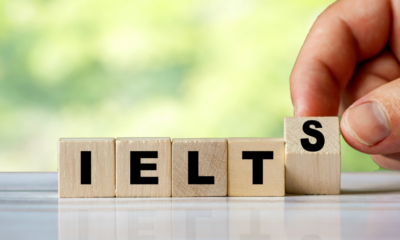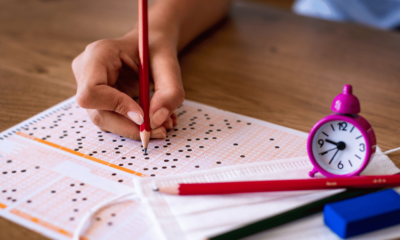SAT
Cracking the SAT Math Section: Tips, Tricks, and Strategies

Cracking the SAT Math Section: Tips, Tricks, and Strategies
The SAT Math section is a significant component of the exam and mastering it can significantly boost your overall score. Here, we present a comprehensive guide to help you in Cracking the SAT Math section with valuable tips, tricks, and strategies.
1. Know the Format:
Familiarize yourself with the format of the SAT Math section. It consists of two parts: a calculator-allowed section and a no-calculator section, both featuring multiple-choice and grid-in questions. Mastery of the SAT Math section begins with a comprehensive understanding of its format. To optimize your performance, it’s imperative to familiarize yourself with the intricacies of this section.
a thorough understanding of the SAT Math section’s format is a foundational step toward success. By recognizing the nuances of the calculator-allowed and no-calculator sections, as well as mastering multiple-choice and grid-in-question formats, you position yourself to navigate this segment with precision and confidence. Remember, on the SAT, strategic preparation is the key to unlocking your full mathematical potential.
2. Understand the Content:
3. Pace Yourself:
Time management is crucial. The SAT Math section is time-sensitive, so practice pacing yourself during your preparation to complete all questions.
4. Use Your Calculator Wisely:
Strategic use of your calculator is pivotal in the SAT’s calculator-allowed section. While it proves invaluable for intricate calculations, it’s important to wield it judiciously. Not every question necessitates its use, and there are instances where relying on mental math can be a quicker and more efficient approach.
In the calculator-allowed section, use your calculator strategically. It can save time for complex calculations but isn’t always necessary. Sometimes, mental math is quicker.
5. Algebra Rules:
Master algebraic concepts and equations. Algebra questions make up a significant portion of the SAT Math section, so understanding these is key. Achieving proficiency in algebraic concepts and equations is paramount for success in the SAT Math section.
Given that algebra questions constitute a substantial portion of the exam, a mastery of these principles is fundamental. Ensure a comprehensive understanding of algebra to confidently tackle the varied algebraic problems presented in the SAT, thereby enhancing your overall performance.
6. Geometry Skills:
Cultivating robust geometry skills, especially in key areas such as triangles, circles, and coordinate geometry, is essential for SAT success. Practice and enhance your ability to visualize geometric figures, as these skills are crucial for effectively navigating the geometry-related questions on the SAT. A solid foundation in geometry will empower you to approach these problems with confidence, contributing significantly to your overall performance in the exam.
7. Use Process of Elimination:
When in doubt, use the process of elimination to rule out incorrect answer choices. This increases your chances of selecting the right answer. Before submitting your answers, review your work to check for any errors or omissions.
Cracking the SAT Math section requires a combination of knowledge, skill, and strategy. By following these tips, tricks, and strategies, you can confidently approach the SAT Math section and work towards achieving your target score.
Reach us for SAT Coaching in Hyderabad
Call us on +91-7416905590 for more info.
SAT
8 Most Common SAT Mistakes Made by Students

8 Most Common SAT Mistakes Made by Students
The SAT is a crucial step in your academic journey, and the most common SAT mistakes made by students can significantly impact your score. Securing a commendable score opens doors to esteemed educational institutions, scholarships, and a promising future. However, many students unwittingly stumble into common pitfalls that can adversely affect their performance. Here are the 8 most common SAT mistakes made by students :
1. Procrastination:
Effective time management is the bedrock of SAT success. Far too often, students underestimate the importance of pacing themselves during the exam. Procrastination can lead to rushed responses and incomplete sections, jeopardizing the overall score.
In the crucible of the SAT, where every minute counts. The allure of delaying tasks may seem innocuous initially, but as the clock ticks inexorably, the consequences become palpable. A delayed start transforms into hurried attempts, compromising the quality and accuracy of responses.
2. Neglecting Official Practice Tests:
Students often overlook the importance of official SAT practice tests. These tests closely simulate the real exam, helping you get accustomed to the format and timing.
Consider official practice tests not merely as preparatory exercises but as strategic simulations that offer a glimpse into the nuances of the actual exam. They are not just a means of gauging your knowledge but a portal into the very framework of the SAT. Every question, every section, and every timing constraint mirrors the authentic testing experience.
The importance of these practice tests lies in their ability to bridge the gap between theoretical knowledge and practical application. While textbooks and study materials provide essential content, official practice tests elevate your preparation by presenting questions in a manner that closely mirrors the complexity and diversity of the real SAT.
3. Lack of Time Management:
Poor time management during the test can lead to unfinished sections and lower scores. Practice pacing during your preparation to ensure you complete all questions. Effective time management is the bedrock of SAT success. Far too often, students underestimate the importance of pacing themselves during the exam most is the common SAT mistake made by students.
4. Ignoring Weaknesses:
Identifying and addressing weaknesses is a proactive strategy that sets the stage for targeted improvement. This involves a candid self-assessment, scrutinizing performance in practice tests and identifying recurring challenges. Whether it be specific question types, time management issues, or conceptual gaps, acknowledging weaknesses lays the foundation for a focused and strategic study plan.
5. Relying on Guesswork:
Guessing without a strategy is the most common SAT mistake made by students. Develop educated guessing techniques, like the process of elimination, to increase your chances of guessing correctly.
The key to navigating the fine line between guesswork and strategic guessing lies in the development of educated techniques. A crucial strategy is the process of elimination—a methodical approach where you systematically eliminate incorrect answer choices, narrowing down the possibilities and increasing the probability of selecting the correct answer.
6. Neglecting the SAT Essay (if applicable):
If your college choices require the SAT Essay, neglecting it can be detrimental. Practice writing essays and understand the essay grading criteria.
7. Memorization Over Understanding:
The SAT is designed to assess your ability to analyze, interpret, and apply knowledge across various domains, including mathematics, critical reading, and writing. Memorizing answers in isolation may offer a temporary solution for specific questions, but it fails to cultivate the depth of understanding required to tackle the diverse challenges posed by the exam.
8. Not Managing Test Anxiety:
Confidence is an invaluable asset on the SAT, and effective anxiety management plays a pivotal role in maintaining it. When anxiety is controlled, the focus is heightened, enabling you to approach each section with clarity and composure. This not only bolsters your problem-solving abilities but also ensures that you can showcase your true academic potential.In conclusion, test anxiety is a formidable opponent, but with proactive management through relaxation techniques.
Being aware of these most common SAT mistakes made by students can help you navigate your SAT preparation more effectively and achieve your target score.
Reach us for SAT Coaching in Hyderabad
Call us on +91-7416905590 for more info.
SAT
5 Tips to Manage SAT Test Anxiety!

5 Tips to Manage SAT Test Anxiety
Experiencing anxiety before the SAT is common, but it’s essential to manage it effectively to perform your best. Here are five valuable tips to manage SAT test anxiety:
1. Preparation Is Key:
Mastering the SAT and conquering test anxiety go hand in hand, and the ultimate key to achieving both lies in meticulous preparation. The intensity of your study sessions and the frequency of practice directly correlate with the level of confidence you’ll exude on test day. Becoming intimately acquainted with the intricacies of the test format and the breadth of its content emerges as a potent antidote to anxiety, fostering a sense of familiarity and control.
2. Practice Under Test Conditions:
Simulate test conditions during your practice sessions. Take official SAT practice tests in a quiet, timed setting to get a feel for the real exam environment. This will help reduce the shock factor on test day.
Simulating the test environment during practice sessions is akin to a dress rehearsal. Choose a quiet, distraction-free space, and strictly adhere to the time constraints of each section. This mirrors the conditions you’ll encounter on test day, minimizing surprises and helping you become accustomed to the exam setting.
Elevate your confidence to new heights through relentless and intense practice. Engage in a multitude of mock exams and dive into an array of sample questions, forging a familiarity with the SAT landscape that transforms uncertainties into opportunities for success.
3. Develop Relaxation Techniques:
Practice relaxation techniques such as deep breathing, visualization, and mindfulness. These methods can help calm your nerves and improve your focus during the test.
Take short nature walks or spend time outdoors to rejuvenate your mind. Fresh air and natural surroundings have a rejuvenating effect, helping to clear your mind and reduce stress. Integrate positive affirmations into your pre-test routine. Repeat phrases that affirm your capabilities and instil confidence. Positive self-talk can shift your mindset and reduce anxiety.
Embracing relaxation techniques is a powerful strategy to cultivate a sense of calm and sharpen your focus during the SAT.
4. Stay Healthy:
Leading up to the SAT, prioritize your physical and mental well-being. Get enough sleep, eat well, and engage in regular physical activity. Staying healthy can significantly impact your ability to manage stress.Maintaining optimal health is a foundational pillar for peak performance, especially in the lead-up to the SAT.
Prioritizing both your physical and mental well-being is not just a lifestyle choice but a strategic approach to enhance your ability to manage stress and perform at your best.
Stay adequately hydrated by drinking plenty of water throughout the day. Dehydration can affect cognitive function and concentration, so maintaining proper fluid levels is crucial for mental alertness.
Engage in regular physical activity to boost both your physical and mental well-being. Exercise is a natural stress reliever, promoting the release of endorphins that contribute to a positive mood and enhanced focus.
5. Positive Self-Talk:
Replace negative thoughts with positive affirmations. Instead of dwelling on what could go wrong, focus on your strengths and your ability to handle the test. Self-assurance can reduce anxiety.
Cultivate a positive mindset as a byproduct of your exhaustive preparation. Witnessing the tangible progress reflected in your practice scores instils a profound sense of optimism and self-assurance, transforming your mindset into an invaluable asset on test day.
By conscientiously prioritizing your health in the days leading up to the SAT, you empower yourself with the physical and mental resilience needed to face challenges with confidence. Staying healthy is not just a means of preparing for a test; it is an investment in your overall well-being and a cornerstone for sustained success in your academic journey.
Remember that some level of anxiety is normal, and it can even be a motivating force. The key is to channel it positively. With preparation, practice, and the right mindset, you can effectively manage SAT test anxiety and perform at your best.
Reach us for SAT Coaching in Hyderabad
Call us on +91-7416905590 for more info.
SAT
5 Key Factors to Consider While Choosing SAT Test Dates in 2023

5 Key Factors to Consider While Choosing SAT Test Dates in 2023
Selecting the right SAT date is a crucial decision that can impact your preparation and performance. In 2023, several factors should guide your choice of test dates. Here are five key factors to consider:
1. College Application Deadlines:
College and university application deadlines vary, and they are often set months before the start of the academic term. Understanding these deadlines is essential to ensure timely submission of your application materials, including your SAT scores.
Be mindful of the application deadlines set by the colleges or universities you’re interested in. Choose a test date that allows sufficient time for score processing and sending them to your chosen institutions. Missing deadlines can impact your chances of acceptance.
2. Personal Readiness:
Assessing personal readiness is a crucial step when considering an SAT date. Rushing into the exam without adequate preparation can have a significant impact on performance and overall confidence.
Evaluate your understanding and mastery of the content covered in the SAT. Assess your proficiency in critical areas such as math, reading, and writing. If there are specific topics causing challenges, determine whether you’ve given them ample attention in your preparation.
Analyze your performance in practice tests. These simulations provide a glimpse into your potential score and highlight areas for improvement. If consistently score below your target or encounter challenges in specific sections, it may indicate a need for further preparation.
Consider your ability to manage time effectively during practice tests. The SAT is a timed exam, and honing time management skills is crucial. If you find yourself frequently running out of time, it might be an indicator that additional practice is needed.
3. Retake Options:
When it comes to the Key Factors to Consider While Choosing SAT Test Dates is planning for score improvement through retake options is a prudent strategy. Understanding the process of retaking the SAT can significantly enhance your chances of achieving a higher score.
Acknowledge that retaking the SAT is an option. Select an initial test date that allows time for score analysis, preparation adjustments, and registration for a retake if necessary. Keep an eye on application deadlines and plan accordingly.
Plan your initial SAT test date with a timeline that allows for score analysis and subsequent preparation adjustments. Be aware of upcoming SAT dates and choose one that aligns with your preparation goals. Ensure that there is sufficient time between your initial test date and the retake to implement focused improvements.
4. Academic Calendar:
Consider your academic calendar when scheduling the SAT. Ensure that your chosen date doesn’t clash with major exams, projects, or personal commitments. Key Factors to Consider While Choosing SAT Test Dates is having a clear schedule that allows focused preparation without unnecessary distractions.
The key Factor to Consider While Choosing SAT Test Dates is to identify the periods when major exams, whether standardized or specific to your coursework, are scheduled. Choosing an SAT date that doesn’t coincide with these exams is crucial to avoid overwhelming academic stress and to ensure that you can dedicate ample time to both the SAT and your regular studies.
When considering your academic calendar for scheduling the SAT, it’s essential to take a thoughtful and strategic approach. The academic calendar encompasses various key elements, and aligning your SAT date with these considerations can significantly impact your preparation and performance.
5. Seasonal Considerations:
Be mindful of the season. Consider the weather and personal preferences. Some students perform better in cooler months, while others prefer the warmth. Choose a season that aligns with your comfort and focus. Certain seasons may affect your concentration and energy levels. If you perform better in a specific season, aim for a test date during that time to enhance your overall performance.
Conclusion
In conclusion, selecting the right SAT date and Key Factors to Consider While Choosing SAT Test Dates plays an important role. From preparation time to individual circumstances and external factors like weather, each element plays a role in optimizing your chances for success. By strategically planning your SAT date, you set yourself up for a smoother testing experience and increased confidence.
Reach us for SAT Coaching in Hyderabad
Call us on +91-7416905590 for more info.
-

 IELTS5 months ago
IELTS5 months agoHow Does IELTS Help You in Higher Education? 7 Things You Should know Today
-

 IELTS5 months ago
IELTS5 months agoAcing the IELTS Listening Section: 6 Tips & Strategies
-

 GMAT5 months ago
GMAT5 months agoChoosing the Right GMAT Prep Course: Factors to Consider!
-

 IELTS5 months ago
IELTS5 months agoIELTS Test Format You Need to Know!
-

 SAT5 months ago
SAT5 months ago8 Most Common SAT Mistakes Made by Students
-

 IELTS5 months ago
IELTS5 months agoImproving IELTS Writing Test Scores!
-

 IELTS5 months ago
IELTS5 months agoIELTS Material and Resources: Get IELTS Tips, Tricks & Practice Test
-

 SAT5 months ago
SAT5 months ago5 Tips to Manage SAT Test Anxiety!


